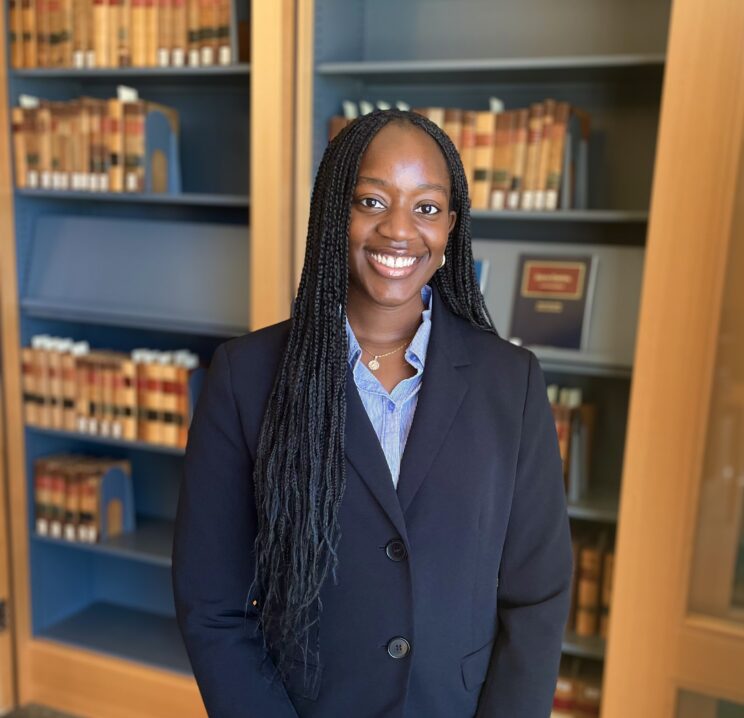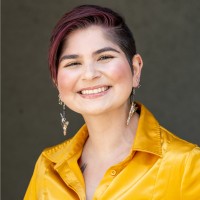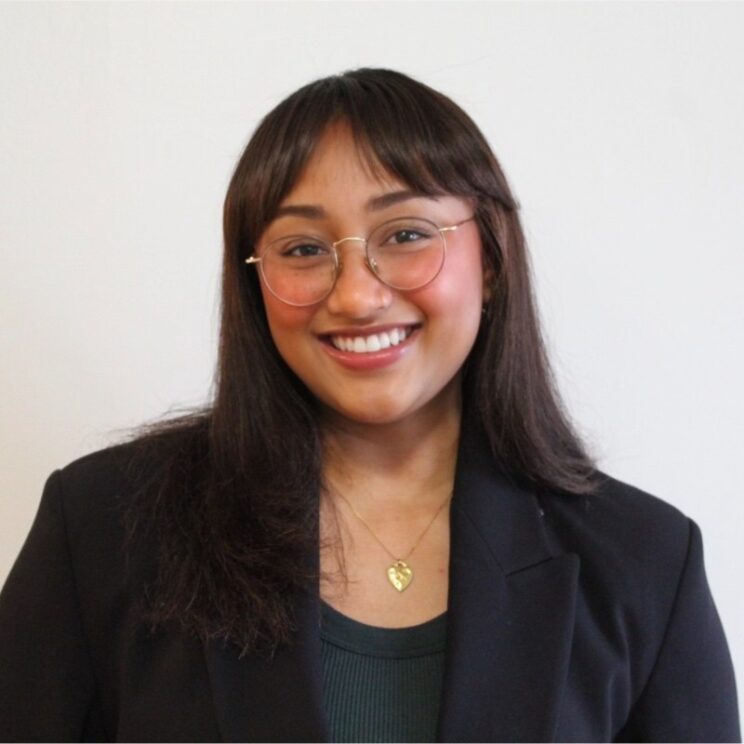


The Justice & Diversity Center (JDC) of the Bar Association of San Francisco (BASF) is proud to announce the 2024 recipients of its Bay Area Minority Law Student Scholarships. Thanks to the generosity of donors, three scholarships will be awarded to minority students attending Bay Area law schools this fall.
Scholarship donors include: The Arthur and Charlotte Zitrin Endowment, AT&T, and Morrison and Foerster Foundation.
The 2024 scholarship recipients are Salymata Boury, 1L USF Law, Cassidy Medina, 1L UC Law SF, Nicole Mason, 1L USF Law;
Salymata Boury is a 1L at the University of San Francisco School of Law. As a first-generation student and a daughter of Senegalese immigrants, her identity is deeply rooted in intersectionality. Even though she was born in Berkeley, she lived in Dakar from ages two to nine. She spent four years living with her aunt as her parents did not have the means to care for themselves, her two older sisters, and her. She still lived in the same neighborhood as her family and would see her sisters on the bus on the way to school. At the time, this separation from her family was distressing and cost her a decent amount of tears. Still, she did not give up on the possibility that she would one day live with her family again, and when it happened, she cherished every moment.
When she moved back to the United States, she became even more aware of her multifaceted identity. She had to learn to navigate social perceptions of what it means to be Black in America for the first time. While she understood what colorism was, she had never experienced its equally harmful counterpart, racism. At school, she had classmates casually use derogatory language to get her reaction. In stores, shopping meant exposing herself to racial profiling. When she worked in retail, she even experienced workplace violence from a coworker who targeted minority women employees. It became clear that her skin color was now a source of discrimination and ridicule. Instead of succumbing to this arbitrary categorization, she wanted to explore how each part of her identity interconnects.
She is a person who knows prejudice and can articulate not only the hardships but also the solutions needed to break the stigma surrounding what it means to make an impact in minority communities. She chose to recognize her socioeconomic status, racial and ethnic background, and gender not to glorify the conditions of struggling but to highlight her ability to be adaptive and develop the willingness to conquer trying situations, allowing her to be the person she is today and the future law student she hopes to become. She plans to remain resilient in herself and her work as she enters law school and, eventually, the legal profession. She is prepared to face the challenges of a legal career. Her interest in pursuing a career in public interest litigation and community advocacy, combined with her dedication to complete law school and pass the Bar, would lead her to opportunities where her work is to help bridge the inequality gap. Beyond her passions, she has had multiple experiences working in the legal profession, where she developed her legal research and writing skills, professionalism, and advocacy within the legal field. The law is an instrument for society’s advancement and not a mechanism that perpetuates injustice. She aspires to solidify her understanding of how laws are created and enforced through competence and dedication to the mission of service.
Cassidy Medina is a 1L at the University of California College of Law and sponsored by AT&T. “You must swallow your fear and be strong. You are a leader, not a follower.” Her grandmother’s words have been branded onto her core for so long that they are her first memory. She lost her parents at a young age due to substantial vices that gave way to prison sentences. Even at fourteen, she would run under the kitchen table of her grandparent’s house when the doorbell rang, fearful that her mother’s family try another kidnapping attempt. Her mother’s family constantly tried to take her to continue their previous abuse.
However, when her grandmother picked her up one day from second grade, she was given a chance to escape an environment that had forced her childhood into nonexistence. After five years of legal battle, her paternal grandparents obtained guardianship over her, but the violent attempts to take her from them in the process left a deep scar. Although painful, these memories live alongside her grandmother’s words and the strength she imparted to her. Her goal is to evoke her spirit by helping those in unfortunate situations like hers to rebuild their strength. This has given her the resolve to follow her purpose, which she has sworn to pursue since that first court date: fulfilling a practice in law.
Even after her grandparents obtained guardianship, her life continued to have some major bumps along the way. After her junior year of high school, she was diagnosed with Lupus, but this disabling autoimmune disorder did not stop her from pursuing the professional plans she had envisioned for myself. She completed her first year at the University of Chicago with successful grades and the belief that she would flourish. In her second year, she founded Students for Disability Justice, an organization through the University of Chicago where disabled students would find kinship. It quickly gained traction within campus spheres dedicated to advocacy and social justice. She finally understood that the sense of leadership her grandmother instilled in her could be harnessed to usher in a vibrant, unwavering community of disabled students.
The strength grasped in her most vulnerable moments was paying off through the leadership position her grandmother gave her the confidence to pursue. But circumstances changed when the pandemic began, and her grandmother received a diagnosis of stage IV stomach cancer. As soon as she was sent home in March 2020, she quickly donned the hats of a student, advocate, and caretaker. During lectures, she would turn off my camera to sew in her grandmother’s G-tube. She became both a full-time student and a nurse.
In June of 2021, her grandmother passed away. She could not let grief extinguish her flames of resilience and leadership. Her grandmother gave her the foundation to become unshakeable. By pursuing a legal education, she is fulfilling her own life and creating pathways for children in similar situations to step out of fear and into tenacity. She has truly “swallowed her fear” and achieved the trailblazer mindset that her grandmother always believed to be true.
Nicole Mason is a 1L at the University of San Francisco School of Law and sponsored by Morrison and Foerster. On a warm August morning, police officers, holding back a mob of white citizens, escorted ten young African American children into their school. “Get in line!” an older man yelled at a young African American boy, stumbling over his oversized, hand-me-down shoes. The first day of kindergarten, what should have been the bright dawn of his educational journey, was dark. He lived in a small, predominantly white neighborhood in the southwest part of Dallas, Texas called DeSoto. Even after the decision in Brown v. Board of Education, the little boy endured another 6 years of segregated schooling before the district attempted to integrate the classroom. That little boy was Nicole’s father.
Nearly a half-century later, she grew up in a predominantly white community in California’s Central Valley. Half-Black and Half-Filipina, she was one of the few racially mixed students in her classes and was the daily target of laughter at recess for the way she dressed or did her hair. Throughout her life, she dealt with painful occurrences of discrimination and oppression academically, occupationally and in sports. In response to this, she remained very shy and reserved, often feeling powerless. It was only after confiding to her dad about the kids at school, that he decided it was time to share his story with her. Listening to her dad talk about the cruelty forced upon him infuriated her.
Though her experience with discrimination was not nearly as severe as what her dad experienced, it stems from the same xenophobic views that made her, her dad, and others alike feel voiceless. Now, having worked at a public interest law firm for two years, she has seen first hand how attorneys are able to use their knowledge and their voice to be a lending hand within their community. Moreover, her role as a caseworker has already pushed her to use her voice in ways she hadn’t before. Serving clients as they fear losing access to safe and stable housing has given her the opportunity to use her training and personal experiences to advocate their rights as tenants. A few months into her role, she helped an elderly disabled woman, who fell behind on rent due to her high medical expenses. By helping her find alternative housing and supporting the attorney to advocate for her rights, she was able to ensure that her record was free from an eviction and credit remain untouched. The gentle hug and tears of joy she shared, knowing she was safely housed without fear of discrimination, that she knew her heart was right where it belonged. The endless cycle of feeling oppressed, powerless and vulnerable is what drives her devotion to become a lawyer. She plans to help strip society of discriminatory practices and by doing so, redeem the little girl she once was by giving her the voice she longed for. She will stand for every person to have an equal opportunity to live life unrestricted by discrimination, retaliation, and harm: the life her father deserved.
Scholarships were awarded based on financial need, scholastics, involvement in public service and barriers faced in life. Each recipient will receive a $10,000 scholarship for the 2024-2025 academic year, which may be renewable for an additional one to two years. Donors of former and continuing scholarships include Morrison & Foerster, AT&T, Coblentz, Patch, Duffy & Bass, PG&E, Keker, Van Nest & Peters, and many others.
Since its inception in 1998, the Bay Area Minority Law Student Scholarship program has awarded more than $2 million in support to over 100 students. The program was established to reaffirm a commitment to diversity in legal education and the legal profession.
